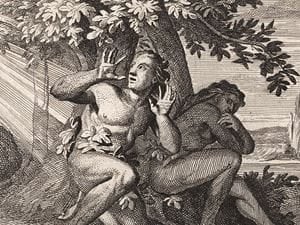
Adam was the first man ever to exist. God created him as the first human being, placing him in the Garden of Eden, designed specifically for him. Every human who has ever lived is a descendant of Adam; through him, every human being inherited a sinful nature, according to Romans 5:12.
Genesis 1 tells us that God spoke everything in the universe into existence. However, on the sixth day of creation, God changed His routine. He got in the dirt and created Adam from clay. Then, He breathed His breath into Adam’s nostrils, making him a living soul, as detailed in Genesis 2:7. God’s breath separates humans from animals. Starting with Adam, every human since shared an immortal spirit with God. God created an entity like Him so that man could reflect, reason, intuit, and choose his paths.
Genesis 2:21-22 tells us Eve, the first woman, was created from Adam’s rib. God put the couple in His perfect world with only one rule: they could not eat from the Tree of the Knowledge of Good and Evil. Adam’s option to disobey was there because humans wouldn’t be completely free without that. God created Adam and Eve as free people, allowing them to have free reign and make choices for themselves.
Genesis 3 shares the story of Adam’s choice to sin. Eve and Adam disobeyed God’s rule, eating from the forbidden tree. In their disobedient act, they brought the consequences of sin into God’s perfect world. Sin entered the world through Adam, and with sin came death. We acknowledge that Adam was an actual person, not a fable because he’s referenced as a real person throughout the Bible. Luke, a great historian, traces Jesus’ lineage back to Adam in Luke 3:38. Adam was also the prototype for every human that came after him.
Kings, priests, and prophets, born with a sinful nature, were the first Adam’s children. First Corinthians 15:47 says that Jesus, born sinless, was the “second Adam.” While the first Adam brought sin into the world, the second Adam brought life. Jesus offers rebirth with a new life and nature for whoever believes in Him. The first Adam lost paradise, but the second will regain it.
How did Adam and Eve die?
In Genesis 5:5, we learn that Adam was 930 years old when he died. The Bible doesn’t share how old Eve was when she died or how the couple died, but we can assume they died from natural causes or old age. Adam’s children and grandchildren also lived into old age; the ten patriarchs born before the Great Flood lived to be about 900 years old, except Enoch. Genesis 5:9 says that Seth, Adam’s son, lived to be 912 years old while Lamech, Noah’s father, died at 777. Methuselah, Noah’s grandfather, lived the longest at 969, as detailed in Genesis 5:27.
The average lifespan for humans changed drastically after the flood. The post-flood patriarchs lived to be 435 years old. People were living less than 200 years by Abraham’s time. The average person lived to 70 or 80 in Moses’ days, considered old when he died at 120.
Did Adam and Eve know what death was?
When God created Adam and Eve, he put them in the Garden of Eden, where they existed in a state of innocence. God gave them free rein to every fruit in every garden tree but one, as detailed in Genesis 2:17. Some people think that Adam and Even’s punishment for rebellion was harsh because before they ate from the forbidden tree, they didn’t know right from wrong.
However, the Bible never says that Adam and Eve didn’t know right from wrong. In Genesis 3:2-3, we read that they understood the difference because Eve knew God told them not to eat the forbidden fruit. Before their sin, Adam and Eve didn’t have experience of evil, but they understood the concept of good and evil, or they wouldn’t know what obeying God’s rules meant. Adam and Eve hadn’t sinned until they ate the forbidden fruit, and their sin was the first step to experiential, first-hand knowledge of the difference between good and evil.
Even if God never fully explained to Adam and Eve why eating from the tree was wrong, they knew it was wrong. Any extra information wasn’t necessary to make the right decision. For example, we know that murder is wrong without explaining why it’s wrong. Adam and Eve not knowing the reason why they couldn’t eat the forbidden fruit doesn’t matter because they knew and understood that eating it was bad. Death exists because of sin, not because of Adam and Eve’s lack of knowledge. God didn’t punish them to death for not knowing something but for acting against what they knew was right.
Death was an outcome of their rebellion, not their ignorance. Adam and Eve didn’t need to see death or experience it to understand that disobeying God’s rule was wrong. In modern times, it’s simple for us to look at death and sin and decide that this viewpoint may have made Adam and Eve more hesitant to disobey God than they were, but that’s an assumption. Whether or not this first-hand knowledge may have changed their choice, we can’t deny that Adam and Eve disobeyed God’s command, and Romans 6:23 tells us, “The wages of sin is death.”
Why didn’t Adam and Eve die immediately after sinning?
Genesis 2:17 says that Adam and Eve would surely die if they ever ate from the Tree of Knowledge of Good and Evil. Still, they ate from the tree but lived to tell the tale. Some believe that Adam and Eve did die, just not a physical death. Others believe that the death refers to a spiritual death. When Adam and Eve ate from the tree, they were separated from God.
Another theory says that spiritual and physical deaths come from original sin. When Adam and Eve sinned against God, their souls separated from God, and their bodies started to die. Their spiritual deadness and sensitivity to physical death have been passed down to all humanity. The Bible doesn’t tell us how Adam and Eve died, but they knew the consequences of their actions.

